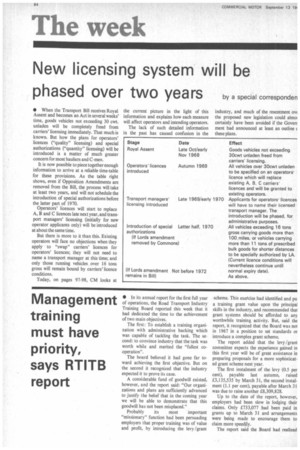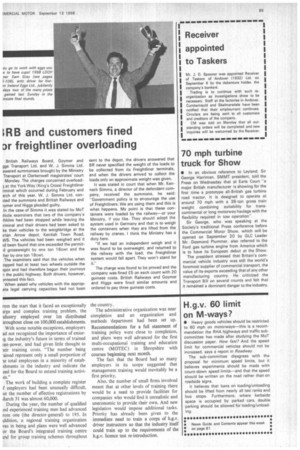Management training must have priority, says RTITB report
Page 86

Page 87

If you've noticed an error in this article please click here to report it so we can fix it.
• In its annual report for the first full year of operations. the Road Transport Industry Training Board reported this week that it had dedicated the time to the achievement of two main objectives.
The first: To establish a training organization with administrative backing which was capable of tackling the task. The second: to convince industry that the task was worth while and merited the "fullest cooperation".
The board believed it had gone far toward achieving the first objective. But on the second it recognized that the industry expected it to prove its case.
A considerable fund of goodwill existed, however, and the report said: "Our organizations and plans are sufficiently advanced to justify the belief that in the coming year we will be able to demonstrate that this goodwill has not been misplaced."
Probably its most important "missionary" function had been persuading employers that proper training was of value and profit, by introducing the levy /grant scheme. This exetcise had identified and pu a training grant value upon the principal skills in the industry, and recommended that grant systems should be afforded to any worthwhile training activity. But, said the report, it recognized that the Board was not in 1967 in a position to set standards or introduce a complex grant scheme.
• The report added that the levy /grant committee expects the experience gained in this first year will be of great assistance in preparing proposals for a more sophisticated grant scheme next year.
The first instalment of the levy (0.5 per cent), payable last autumn, raised £3,135,535 by March 31, the second instalment (1.1 per cent), payable after March 31 was due to raise another £8,309,828.
Up to the date of the report, however, employers had been slow in lodging their claims. Only £733,077 had been paid in grants up to March 31 and arrangements were being made to encourage them to claim more speedily.
The report said the Board had realized
rom the start that it faced an exceptionally iree and complex training problem. the idustry employed over lm distributed lroughout close on 100,000 establishments.
With some notable exceptions, employers ad not recognized the importance of ensurig the industry's future in terms of trained tan-power. and had given little thought to wittraining costs. "The number being .ained represent only a small porportion of le total employees in a minority of estabshments in the industry and indicate the eed for the Board to extend training activies."
The work of building a complete register f employers had been unusually difficult. iut the number of effective registrations by 'larch 31 was 'almost 60,000.
During the year, the number of qualified .nd experienced training men had advanced rom one (the director-general) to 195. In iddition. a regional training organization vas in being and plans were well advanced or the Board's integrated training centre ind for group training schemes throughout the country.
The administrative organization was near completion and an organization and methods department had been set up. Recommendations for a full statement of training policy were close to completion, and plans were well advanced for the first multi-occupational training and education centre (MOTEC) in Shropshire with courses beginning next month.
The fact that the Board had so many employers in its scope suggested that management training would inevitably be a first priority.
Also, the number of small firms involved meant that at other levels of training there would be a need to provide facilities for companies who would find it unrealistic and uneconomic to provide their own. And new legislation would impose additional tasks. Priority has already been given to the immediate need to train a corps of h.g.v. driver instructors so that the industry itself could train up to the requirements of the h.g.v. licence test re-introduction.




































































































































































































































































